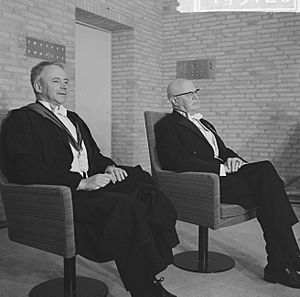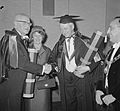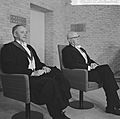Colin Clark (economist) facts for kids
Quick facts for kids
Colin Clark
|
|
|---|---|
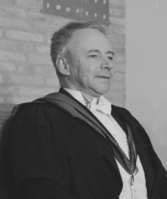 |
|
| Born | 2 November 1905 London, England
|
| Died | 4 September 1989 (aged 83) Brisbane, Australia
|
| Nationality | British/Australian |
| Alma mater | Oxford University |
| Scientific career | |
| Fields | Economics |
| Institutions | Oxford University, Cambridge University, Monash University, University of Queensland |
| Doctoral students | Sir Richard Stone V.K.R.V. Rao Sir Alexander Cairncross Hans Singer |
| Influenced | Angus Maddison |
Colin Grant Clark (born November 2, 1905 – died September 4, 1989) was an important British and Australian economist. He was also a statistician, which means he worked with numbers and data. He is famous for being one of the first people to use something called the gross national product (GNP). This is a way to measure how much a country produces and earns. It helps us understand how well a country's economy is doing.
Contents
Early Life and Learning
Colin Clark was born in London, England, in 1905. He went to good schools like the Dragon School and Winchester College. Later, he studied Chemistry at Brasenose College, Oxford, and finished in 1928.
After college, he worked as a helper for famous thinkers like William Beveridge in London and others in Liverpool. He also tried to become a member of parliament for the Labour Party several times, but he didn't win.
In 1930, he got a job helping the government's new National Economic Advisory Council. He left this job quickly because he was asked to write something that supported "protectionism." This means policies that protect a country's own industries from foreign competition. Even so, he impressed a very famous economist named John Maynard Keynes. Because of this, he got a job teaching statistics at Cambridge University.
Teaching at Cambridge
From 1931 to 1938, Colin Clark taught statistics at Cambridge University. While he was there, he wrote three important books. His first book, The National Income 1924–31, was highly praised by John Maynard Keynes. Keynes even called Clark "a bit of a genius" and "first-class" at understanding economic numbers.
Moving to Australia
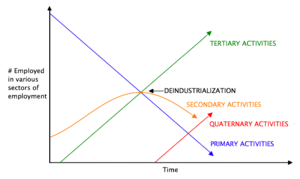
In 1937 and 1938, Colin Clark visited Australia and New Zealand. He liked it so much that he decided to stay in Australia. He was offered a job with the Queensland Government by the premier, Forgan Smith. Clark wrote to Keynes that this was a "remarkable opportunity" to use his economic ideas in real life.
On May 6, 1938, he became the Government Statistician and Financial Advisor for Queensland. He created the state's first economic reports in 1940. He also helped with the Commonwealth Department of War Organisation of Industry during World War II. In 1947, he became the Under Secretary of the Queensland Department of Labour and Industry.
Even though he worked for the government, he kept writing academic papers and books. His book Conditions of Economic Progress was published in 1940.
Later Years and Global Work
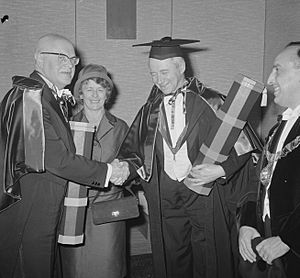
In 1951, Colin Clark worked for the Food and Agriculture Organization in Rome. Then he went to the University of Chicago in 1952. After that, he became the Director of the Agricultural Economics Research Institute at Oxford University from 1952 to 1969.
He returned to Australia in 1969. He led the Institute of Economic Progress at Monash University until 1978. Finally, he worked as a research consultant at University of Queensland until he passed away in 1989.
Family Life
Colin Clark married Marjorie Tattersall in 1935. They had a very large family with eight sons and one daughter. Together, their children gave them 50 grandchildren! His son Gregory became an author and academic in Japan. His nephew is Geoffrey Hinton, a famous scientist in psychology and computers.
Marjorie's sister, Viva Tattersall, was an actress in plays and Hollywood movies.
His Legacy and Awards
Colin Clark was recognized as a very important economist.
- In 1984, the World Bank called him one of the "pioneers of development." This means he was one of the first people to think deeply about how countries grow and improve.
- In 1987, he and Professor Trevor Swan were the first to receive the Distinguished Fellow awards from The Economic Society of Australia. This is a very high honor for economists in Australia.
He also received many honorary doctorates from universities around the world, including Tilburg University, Oxford University, the University of Milan, Monash University, and University of Queensland. An honorary doctorate is a special degree given to someone who has achieved great things, even if they didn't study that subject at that university.
Today, there is a special lecture named after him at the Australasian Meeting of the Econometric Society. Also, a building at University of Queensland is named after him. It's even said that a stone carving in the university's Great Court looks like him!
Death
Colin Clark passed away in Brisbane, Australia, in 1989. He is buried with his wife Marjorie at the Mount Gravatt Cemetery in Brisbane.
Images for kids
-
Clark's model showing how an economy changes as technology improves. Later on, the Quaternary sector of the economy grows.
-
Carl Romme (left) and Colin Clark getting an honorary degree from Tilburg University in 1962. Clark's wife Marjorie is between them.
 | James Van Der Zee |
 | Alma Thomas |
 | Ellis Wilson |
 | Margaret Taylor-Burroughs |


